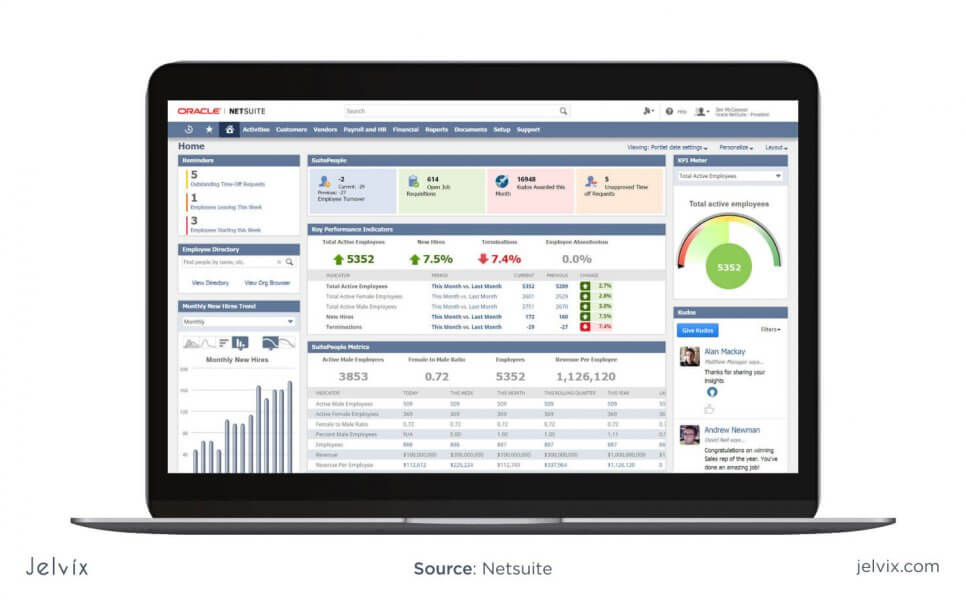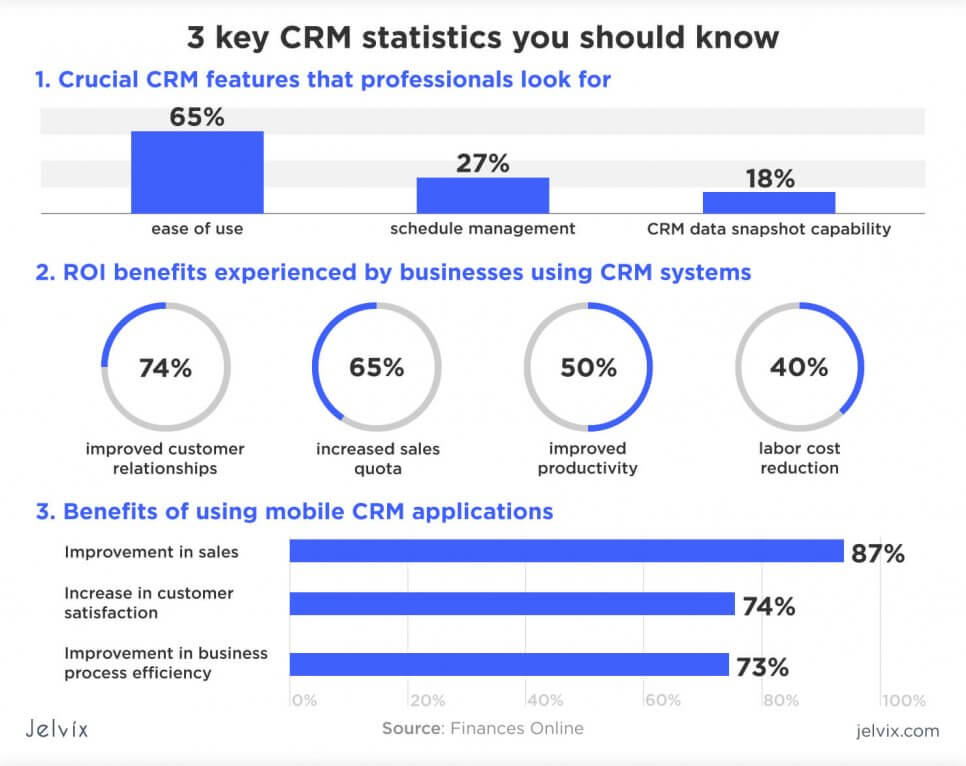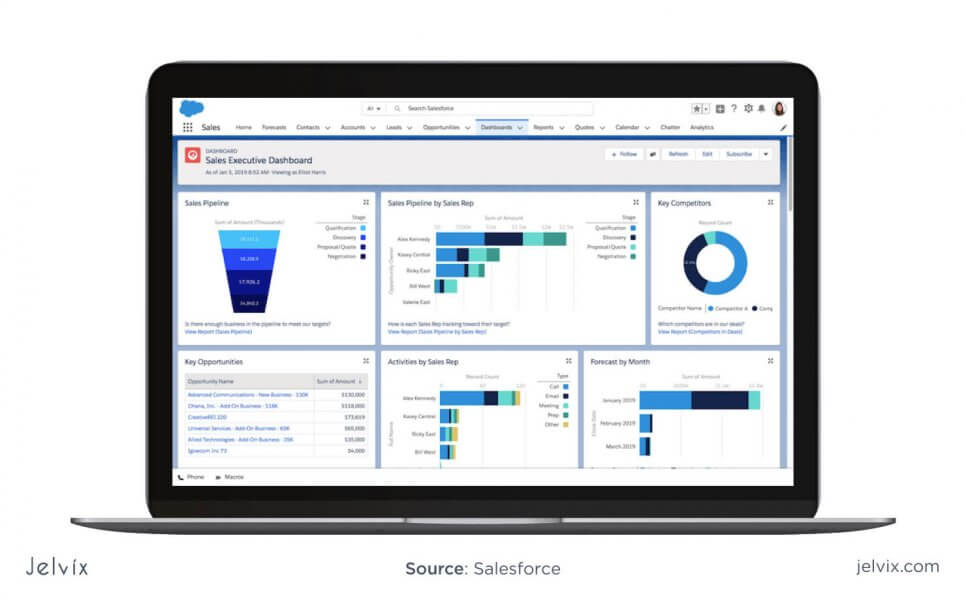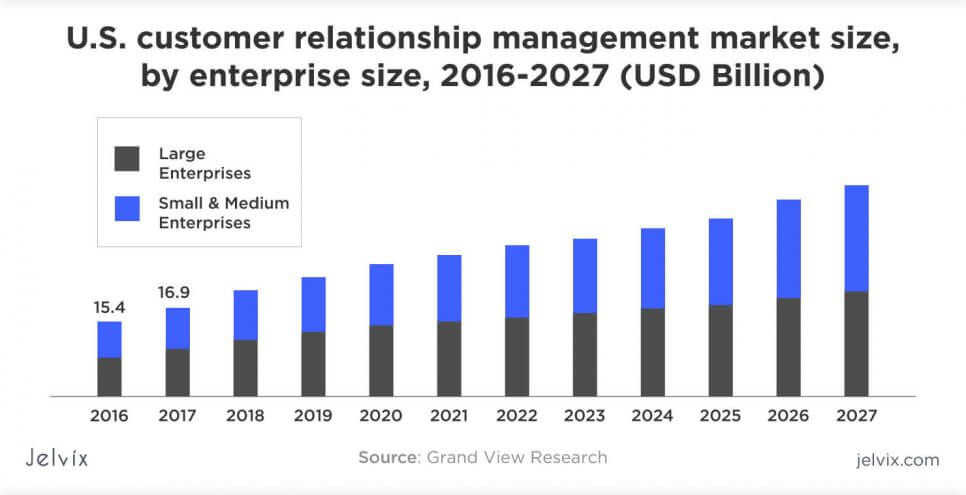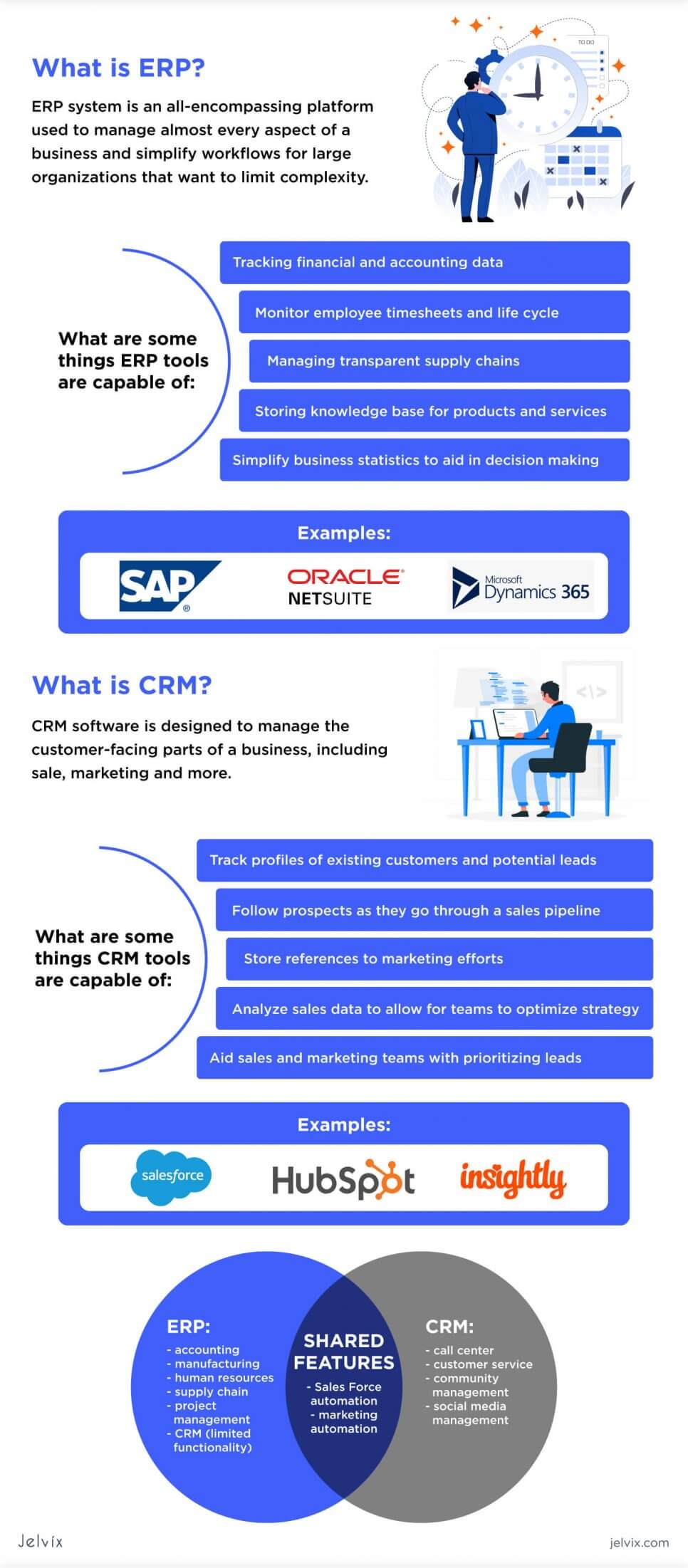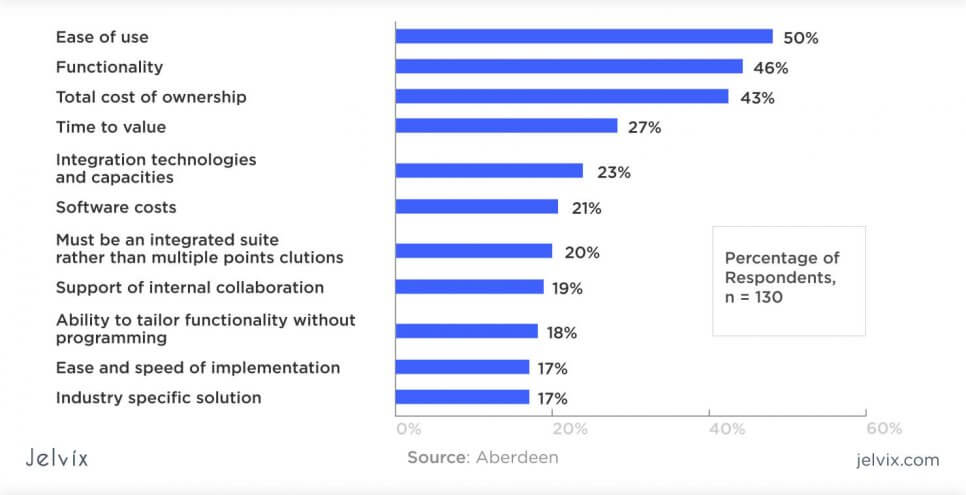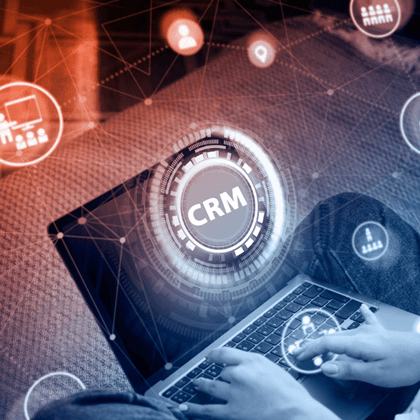Your organization’s growth is often tied to the tools that you choose to implement your business plan. Given that it’s such a crucial part of success, these tools have become a divisive topic.
At the core of this conversation are both CRM and ERP software platforms. Both of these pieces of software are perhaps the most critical assets that will determine the growth and success of your business.
Both types of software increase profits but do it in different ways. They drive growth, integrate with multiple departments, and ultimately set the tone for your organization’s processes and workflows. As the world becomes more digitized, these tools have only improved their functionality and solidified their place as part of every successful company.
Customer relationship management (CRM) and enterprise resource planning (ERP) often serve as the most important part of an organization’s toolbox. Selecting, integrating, and managing this software is a time-consuming process, so businesses try hard to select not only the right platform for the present, but also for the future.
Deciding to implement either an ERP or CRM is a complex one, driven by an organization’s goals and the overall marketplace they find themselves in.
What is Enterprise Resource Planning?
ERP systems are used to manage almost every aspect of a business. This includes things like inventory management, accounting, payroll, and more. It’s an all-encompassing platform that simplifies workflows for large organizations that want to limit complexity.
What are the benefits of enterprise resource planning?
By implementing an ERP, businesses avoid a glut of third-party vendors that introduce a high barrier to entry for new employees to understand business processes. These one-stop shops are often less detailed in any one area than these vendors, but there is value in keeping everything in a single ecosystem.
According to Panorama Consulting Solutions, businesses implement an ERP system so they can enhance business performance. The same report cites that the software improves customer satisfaction and reduces time spent on various processes. Workflow improvements are reported almost across the board among businesses that choose to implement an ERP. And for large companies, that can lead to substantial revenue improvement.
Here are just some of the things that ERP tools are capable of:
- Tracking financial and accounting data
- Monitor employee timesheets and life cycle
- Managing transparent supply chains
- Storing knowledge base for products and services
- Simplify business statistics to aid in decision making
What is the scope of ERP tools?
ERP tools are capable of guiding a project from conception to completion. This greatly benefits enterprise-size organizations since the uniformity of project management and inter-department communication cuts down on confusion and maintains high levels of transparency.
In terms of data storage and organization, ERP is also incredibly robust. The software manages almost all data generated by an organization, regardless of source. This allows executives and managers to see an all-encompassing view of the business quickly, which helps large organizations stay nimble.
The data that ERP provides helps organizations avoid operational issues by looking at the numbers quickly and adjusting from there. In this way, it modifies the scope of decision making that businesses are able to do on a daily basis. An example of this is managing inventory, which can be a cumbersome process that ERP mitigates.
What are the limitations of ERP?
The main limitation of most ERP’s comes from their broad scope that makes it so valuable. By attempting to provide vast amounts of information and work for multiple teams within an organization, ERP software can struggle to be user friendly and flexible. Business organizations are incredibly complex and unique, so ERP software may struggle to fully encapsulate every business.
Cost is also a limitation for many businesses when considering an ERP. It can be viewed as a luxury by small or mid-sized companies that would prefer to use smaller vendors that bring a lower cost commitment. Many of these ERP software companies also require lengthy contracts, and the cost of adoption can be high. Integrating ERP into your business can slow down other aspects of your business while you try to get online.
ERP software also only focuses on back-end parts of your business. In terms of customer-facing operations, ERP software is not something that is really used. Industries like manufacturing may not have much need for customer-facing operations, but this can vary by your organization.
What are some examples of popular ERP platforms?
A lot of ERP software decisions come down to the ecosystem that matches your particular industry and goals. There are both boutique and large-scale options for businesses, and this is valuable because the nature of an ERP can be very different depending on your business. According to Computer Weekly, over half of all businesses consider implementing an ERP, making it a growing business, even if it’s not as popular as the CRM industry.
That being said, here are a few of the more popular ERP software platforms that can serve as examples:
What is Customer Relationship Management?
Where an ERP focuses on the company’s processes, a CRM focuses on its customers. Everything from sales to marketing and more is contained within a CRM as organizations try to manage the customer-facing parts of their business. Many CRM’s also include a portion of customer support processes.
What are the benefits of CRM software?
The true value of a CRM is how it lets you track and customize the customer journey from start to finish. As long as your organization has customers, CRM’s provide you with the potential to reach those customers, learn about them, and tailor your communications to convert them. According to BuyerZone, 91% of companies with more than 11 employees use CRM software, and that adoption is only going to increase moving forward.
Most CRM’s track valuable information about your customers so that you can make informed decisions when communicating with them. Things like purchase history, conversation history, contact information, and more make up customer profiles. When combined with high-level marketing analytics, you can learn valuable lessons about your customers as you interact with them.
Customer relationship management software is capable of many features, but here are a few examples:
- Track profiles of existing customers and potential leads
- Follow prospects as they go through a sales pipeline
- Store references to marketing efforts
- Analyze sales data to allow for teams to optimize strategy
- Aid sales and marketing teams with prioritizing leads
Sales teams also benefit greatly from integrating with a CRM. According to Salesforce, companies that use CRM have improved sales by 29%. Meeting quotas is easier and faster when data is centralized, and communication with prospects is collected in one place.
Beyond the goal of gaining new customers, CRM also improves customer retention. Capterra has stated that using CRM increases average retention and satisfaction rates by 47%. By continuing to learn about customers, CRM’s provide value by keeping customers engaged and interacting with your business.
What is the scope of CRM?
Converting people to paying customers is the lifeblood of organizations of all sizes. For that reason, most businesses would benefit from some form of CRM. Small businesses can offer simple communication like coupons and online menus, and larger businesses can share complex networks of blog posts, promotions, and sales demos. The power of your CRM can vary based on your business size, but the value is consistent.
Depending on the size of your customer-facing teams, the CRM can be modified in scope. For large teams, CRM can be a complete platform that manages most of the team’s interactions on a daily basis. For example, an email marketing campaign can be managed from start to finish, including design, audience selection, and performance analytics.
Smaller teams may look towards a CRM to simply provide high-level analytics and data storage. This more nimble version of a CRM can work well for small businesses that just need help gaining insights on the limited amount of sales and marketing they are undertaking.
What are the limitations of CRM?
CRM’s can be limited in scope because the software only affects customer-facing departments. An ERP provides a wide range of information about the full aspect of your business, whereas the CRM is more limited. In some cases, the bulk of your business will not benefit directly from using a robust CRM, even if the overall business definitely benefits from it.
These tools are also limited by your business ability to collect leads. The true power of CRM comes when your top-of-funnel actions are operating efficiently. This ensures that your business is continually running users through the customer journey that can be automated and customized by a CRM. Unfortunately, a CRM is limited in helping you accomplish this, despite its focus on customer communication.
Many organizations have also struggled to fully adopt CRM software. Since customer-facing tasks have been conducted long before the invention of CRM, there are some sales and marketing employees that have trouble working what they do into a standardized CRM process. Sending a customer a quick email is not really something that needs to be tracked, even if CRM would optimize that process and allow a business to make better decisions if it were tracked. This thought process can dampen the potential of CRM software.
Examples of top CRM platforms
According to Grand View Research, CRM software has become the largest software market in the world. Most CRM platforms are made up of similar components, but the features can vary greatly based on which one you choose. There are platforms that are more bespoke that focus on individual verticals, and large-scale tools that aim to provide all the features an organization could ask for. It’s this level of customization that’s led to the booming CRM software industry.
These are some of the more recognizable CRM platforms that provide a complete example of what the tool is capable of:
Should I use ERP or CRM?
Before answering this question, it’s important to realize that these two pieces of software provide different benefits for your organization. While your business may need one tool more than the other, it should not be considered an easy decision. It should really come down to what situation your company is in.
There are a number of factors that determine whether a CRM or an ERP is a good fit for your organization. Here are just some of the questions you may want to ask yourself when making the decision:
- How large is my business, and how much do I expect it to grow?
- Am I more concerned with growing my business or optimizing my business?
- Is there a large number of competitors in my business’ industry?
- How much inter-departmental collaboration exists in my business?
- Am I more interested in providing products or services?
Businesses that benefit more from CRM
In general, smaller businesses will find it more beneficial to focus on their customer base, and therefore a CRM would better assist growth. Small businesses that find themselves limited by cost, and on that basis, an ERP may prove too costly.
While small businesses benefit from CRM, large businesses also see massive benefits in implementing the software. In fact, the data collected by CRM software is even more useful when your organization has a large database of customers and leads. The truth is, any business looking to improve growth, retention, and customer satisfaction would ideally be utilizing CRM tools to accomplish those goals.
According to Nucleus Research, companies that invest in a CRM average an $8.71 return on investment for every dollar spent. This incredible ROI serves as a strong reminder of the value of technology in all organizations.
Which businesses benefit more from ERP?
Businesses that have already reached a strong level of growth may look to an ERP to help them optimize their organization. An ERP is a valuable tool for simplifying processes, limiting excess software, managing inventory, and improving communication. This allows an organization to increase margins on its current customers and improve retention.
Manufacturers are the top users of ERP systems, according to Aberdeen Group. The complexity of this industry is well-served to this form of software. Business leaders need to understand the pipeline of their products from conception to payment and everywhere in-between to make informed decisions. ERP software was designed with this in mind.
The concerns of most manufacturers that choose to partner with ERP software indeed affect all types of industries. However, the software works best in situations where you need to track processes with large amounts of data. That’s why, as businesses grow, they tend to look towards ERP tools as a way to stay optimized.
That being said, if your organization is large enough to find an ERP worthwhile, you have to ask the question about the value of also utilizing a CRM. In fact, it’s becoming rarer for a company to have an ERP without having a CRM.
Learn more about the main stages of product development lifecycle to build a sustainable product.
When would you want both ERP and CRM?
It’s not necessary to limit yourself to one of these options. In fact, the top organizations in the world often utilize both ERP’s and CRM’s to achieve their goals. To return to the primary method for both tools, growth, and optimization, it’s clear that many businesses would like to improve both of those metrics. The key to choosing simply comes down to the scale of data and information your company needs to succeed. The more data you have and the more data you need to process directly translates to your need for these tools.
Once an organization decides to implement both of these tools, the next step is to decide on integration. In many ways, these tools are not compatible with each other. Due to the size of both ERP’s and CRM’s, they don’t necessarily play nice with one another.
There are exciting benefits to implementing both platforms in an integrated way. In the simplest sense, customer-facing teams have a wealth of knowledge at their disposal if they are integrated with an ERP. Things like inventory, timelines, pricing, and more can be easily tied into marketing efforts. The data available on both tools can benefit work done in the other.
Organizations will need to heavily research compatibility if they choose to integrate these tools. Some software will never be compatible, and the engineering costs of forcing the integration can be costly.
In closing, the differences between ERP and CRM are distinct and play a large role in the trajectory of your business. The wrong choice can even stunt growth and add unnecessary complexity that slows your organization down. Business leaders will need to consider every detail about these platforms as it fits with their goals.
Ad-Juster is a market-leading SaaS provider of unified data reporting and analytics for digital advertising. Since its founding in 2007, Ad-Juster has worked closely with over 150 blue-chip publishers, agencies, ad-tech platforms, and ad networks to deliver a digital advertising measurement product line to streamline workflows, overcome billing discrepancies, optimize programmatic performance and maximize revenue.
Have a project in mind?
Extend your development capacity with the dedicated team of professionals.




